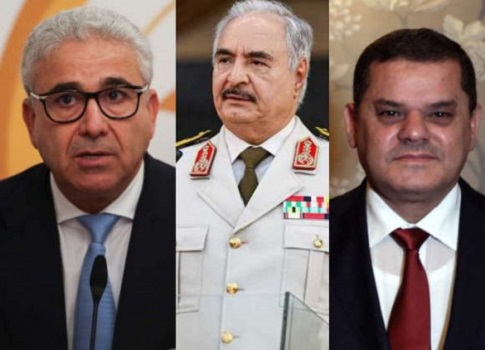Libya: a fight to the finish?

External rivalry over oil and gas means the conflict is likely to escalate
Ever since the US-orchestrated NATO bombardment of Libya in support of the February 2011 revolution to protect Libyan civilians and topple Muammar al-Gaddafi’s ‘dictatorship’, successive ‘revolutionary’ governments and their backers have pledged to serve the public, provide security and stability, and establish a democratic regime that would be the envy of all Arabs.
A very different story is told by the bloody clashes in Tripoli at the weekend between militias aligned to the two rival prime ministers: Abdelhamid Dbeibah in Tripoli and Fathi Bashagha who is backed by the eastern Libyan parliament and Field Marshal Khalifa Haftar. Thirty-two civilians were killed in the clashes, including the popular young comedian Mustafa Baraka, and dozens were injured. It was a lurid reflection of the condition of the Libyan state 11 years after the ‘revolution’ and the intervention in its affairs of several global and regional powers vying over its oil and gas resources.
Libya has two parliaments, both of whose terms have expired, plus a High Council of State and a Presidential Council, two governments — Dbeiba’s in Tripoli and Bashagha’s based for now in Sirte — several armies, a whole host of militias, and numerous armed tribes, all funded and armed by various foreign backers.
The latest assault on Tripoli by pro-Bashagha forces was aimed aim at taking control of the capital and deposing Dbeibah (who insists he will only hand power to an elected government, which he expects to lead). It was a replay of Haftar’s 2019 offensive which was repulsed by an alliance of militias from the city of Misrata — Libya’s ‘Sparta” — along with the Muslim Brotherhood, with substantial support from Turkey and Qatar.
The current calm prevailing in the Libyan capital after two days of clashes is likely to be transitory. Hostilities could resume at any time after the failure of all efforts to bring the warring sides to the negotiating table to agree on a transition process and long-term truce.
The struggle in Libya has always been, and will continue to be, a struggle over oil and gas. It is about controlling the massive reserves contained beneath the benighted country’s deserts and dividing the spoils between the main external players: international (the US, France, Italy, Russia, and the UK) or regional (Turkey, Egypt the UAE, and Qatar).
The violence, terror, and fragmentation the US and Europe brought to Libya has come back to haunt them at a highly sensitive time, when there is a critical global energy shortage due to the Ukraine war and the reduction in volume of Russian supplies.
The US has the most to lose if military confrontations in Libya lead to a reduction in or even complete halt of Libyan oil and gas production in the months ahead. Coupled with uncertainty over the Iran nuclear talks, this could drive prices sky high, hence the Biden administration’s stated concern about the possibility of a supply cut-off and its call for an immediate end to the fighting.
Libya produces around 700,000 barrels of oil per day, and the US wants it to raise that to one million. But this is inconceivable at present. Some analysts see the battles in Tripoli as the beginning of a fight to the finish that could cause a complete shut-down of production facilities whether in the eastern ‘Oil Crescent’ or in the southern region of Fezzan, where there have been tribal and youth protests that threaten to trigger violence that could shut in 300,000 b/d of local production.
Unfortunately, Libya’s political and military conflicts are likely to persist, escalate, and become even bloodier in the days and months ahead. All the international efforts, initiatives, conferences, and conspiracies aimed at achieving a lasting solution and national reconciliation have failed or been foiled. The option favoured by some, early general elections, remains far out of reach. Even if a vote could be held, the losers might not accept the results as has happed after all previous elections.
I say this with get anguish as I have always sided with the Libyan people, by opposing both NATO and all the external interventions that followed, and faced much criticism and abuse for that. Now I can only hope for a miracle.
https://www.raialyoum.com/libya-a-fight-to-the-finish/
 TheAltWorld
TheAltWorld 
0 thoughts on “Libya: a fight to the finish?”